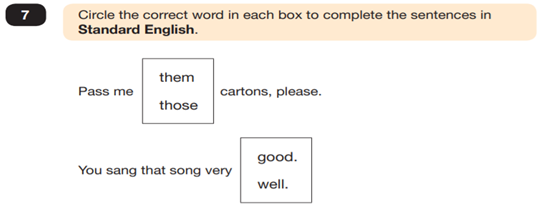Do you know what an adverbial is? What about a relative pronoun? Can you spot your modal verbs from your main verbs?
If most of this grammatical terminology sounds alien to you, then you will most likely struggle to pass the current Key Stage 2 SPaG (Spelling Punctuation and Grammar) test. I am sure without the knowledge of this grammatical terminology, many of you would regard yourselves adept writers and communicators. So, why is it that children aged seven to eleven across England must prove that they can spot these complex grammatical elements, in order to learn to write “properly, creatively and effectively?” (Department for Education, 2013).
The SPaG test was first introduced in England by the UK government in 2013, following Lord Bew’s ‘Key Stage 2 Testing Assessment and Accountability Report’. The report “highlighted significant issues with the existing writing national curriculum test” (DfE, 2011). During 2012 the government’s performance tables also took a hit, as the statistics for writing across primary schools in England were reported to be below average (ouch!) (DfE, 2013). According to Truss, the Education Minister during this time, the SPaG test needed to be introduced so “that primary schools will once again place a strong focus on the teaching of key writing techniques” (DfE, 2013).

(Example taken from the 2019 SPaG test.)
For many opposers of this type of testing, such as Wyse et al (2013, p. 241) exercises like the one above are ineffective and counterproductive when teaching grammar and the skill of writing. They claim that this is because they are “dry as dust, decontextualised [and] old-fashioned” (2013, p. 241). They also determine that children cannot learn about the English Language in meaningful ways through these labelling exercises (2013, p. 241). In his blog, the renowned linguist David Crystal (2013), a supporter of grammar teaching, yet a critic of this type of testing, claims that getting children to identify parts of a sentence out of context will not improve their writing. He argues that more emphasis should be placed on getting children to understand why certain grammatical elements are used. So, do children really need to master the skill of underlining and circling in order to become the next Charles Dickens?
In his blog, the linguist and supporter of the SPaG test, Bas Aarts (2015) emphasises that it is important that children understand the “mechanisms” of grammar and states that “there is a certain joy in knowing the names of the nuts and bolts of things”. The United Kingdom Literacy Association (UKLA, 2013) also value the importance of grasping this terminology, as they claim that “children do need a solid grounding in linguistic terminology in order to have the metalanguage they need to talk about and improve their work”.
However, I can drive a car, like I am sure many of you can, yet I cannot label the “nuts and bolts” of it, nor can I describe its inner workings. So, are the “nuts and bolts” of grammar really that important? Or can children write effectively without describing their inner workings?
The children’s writer Michael Rosen (2015), a fierce critic of the SPaG test, claims in his Guardian report that the test suffers from a “severe case of terminology-itis”; a symptom of which is the myth that teaching and testing this complex terminology will advance children’s writing. In her Times Educational Supplement article, Bousted (2016), the general secretary of National Education Union, claims that children will only advance their writing abilities by having the opportunity to “read widely and […] write stories”, instead of spending time describing grammar and being rigorously tested. So, does this mean that we should permanently ban our subordinate clauses from entering the Key Stage 2 classrooms?
However, according to Rosen (2015) there are several flaws with both the terminology used in the test and the nature of the questions. He suggests that it would therefore fail to work as a metalanguage or an analytical tool to improve children’s writing. For him, the test was “brought in on the evidence-free assumption that […] grammar questions have “right and wrong answers””. Rosen’s observation highlights that children are being taught to see grammar as black and white, without allowing them to regard the changes in the English language depending on context. Another anonymous public comment on Mansell’s Guardian report (2017) also claims that “[g]rammar is fluid, [and] all we’re doing by teaching strict rules is stifling young people’s imagination and creativity”. I am sure young Dicken’s would have found writing both confusing and dull if he were taught to see it in this way.
Milroy (1999, p. 21) claims that many linguists believe that the teaching of these prescriptivist black and white grammatical rules, will benefit disadvantaged children, who have not been exposed to Standard English at home. However, the questions in the test that check children’s knowledge of Standard English like the one below, dismiss the fact that children may use different dialect forms. Does this mean that whilst the government are attempting to improve children’s writing, they are simultaneously making children question the way that they speak and forcing them to regard their own dialects as “wrong?”

(Example taken from the 2019 SPaG test.)
So, do you now feel a sudden urge to check what an adverbial is? Or are you still deliberating over your verbs? Will you rush to learn the grammatical terms used in the most recent SPaG test in the hope that you will improve the flaws in your day to day writing and become a best-selling novelist?
OLIVIA DENTON, English Language undergraduate, University of Chester, UK
References
Aarts, B. (2015, November 6). The study of grammar is interesting in its own right. Grammarianism.
Crystal, D. (2013, May 5). On a testing time. David Crystal Blog.
Department for Education. (2011). Review of key stage 2 testing, assessment, and accountability.
The United Kingdom Literacy Association. (2013). UKLA statement on teaching grammar. UKLA.

